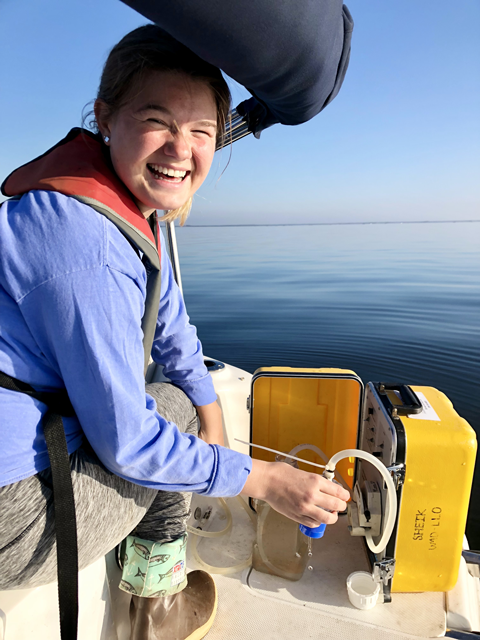 Kaela Natwora, 2023 Deborah Battigelli Memorial Award Recipient. Kaela's research is focused on understanding how nitrogen fixation aids cyanotoxin production in low nitrogen environments
Kaela Natwora, 2023 Deborah Battigelli Memorial Award Recipient. Kaela's research is focused on understanding how nitrogen fixation aids cyanotoxin production in low nitrogen environments
Kaela Natwora, PhD. candidate at the University of Minnesota Duluth Large Lakes Observatory, is a recipient of the 2023 Deborah Battigelli Memorial Award. Presented by the Foundation, on behalf of the Battigelli family, this Award provides financial assistance to graduate students to present their research at the annual International Rainy-Lake of the Woods Watershed Forum.
Kaela's research is improving our understanding of how nutrients, specifically nitrogen (N) promotes and sustains cyanobacterial harmful algal blooms (cHABs) and potentially fuels toxin production in the south basin of Lake of the Woods.
Kaela will deliver a presentation at the Forum titled "Nitrogen fixation may offset nitrogen demands in Lake of the Woods cHABs, and molecular techniques reveal species responsible for toxin production".
Kaela is part of the Aquatic Microbiology Laboratory team, studying under the supervision of Dr. Cody S. Sheik at the Large Lakes Observatory. Her dissertation research mainly focuses on how nutrients, specifically nitrogen (N) promotes and sustains cyanobacterial harmful algal blooms (cHABs) and potentially funds toxin production. She is specifically interested in a metabolic process called nitrogen fixation, which allows phytoplankton like cyanobacteria to take an inaccessible nitrogen and turn it into a bioavailable form. In doing so, the fixing organism and surrounding microbial community will have a source of nitrogen for growth and various metabolic functions.
Another large part of her research is applying a molecular approach to water quality monitoring. She is using the genetic information of the microbes, their DNA and RNA, to better understand them and what they can do. Specifically, using DNA they are able to identify and quantity microbes in the water and determine what they are capable of doing, or their “metabolic potential”. This could include identifying genes that are associated with toxin production or nutrient acquisition. Taking it a step further, they are using RNA to determine which microbes are actively transcribing for toxin production or nutrient acquisition at the time of sampling.
Kaela notes that for her dissertation research, Lake of the Woods is a compelling study lake for quantifying the effect of nitrogen-fixing cyanobacteria, as it has annual toxin producing cHABs and becomes nitrogen limited prior to the peak of the blooms. Interestingly, Aphanizomenon and Dolichospermum, two species of cyanobacteria observed in Lake of the Woods blooms, are capable of producing toxins and fixing nitrogen. Quantifying nitrogen fixation rates and using molecular tools like 16S rRNA amplicon sequencing, she's hoping to understand how cyanobacteria that are able to create their own nitrogen play a role in blooms on Lake of the Woods and their associated toxin production. Kaela believes that understanding how nitrogen contributes to cHABs and possibly toxin production and identifying the cyanobacteria responsible for toxin production could better inform management of the ecology and nutrient demands of blooms in Lake of the Woods.
To honour the memory of Deborah Battigelli, her family established The Deborah Battigelli Memorial Fund at the Lake of the Woods Water Sustainability Foundation. The Fund honours Deborah’s love of life at the lake and her interest to preserve the lake area for future generations to continue to enjoy what she loved. The purpose is to assist the up-and-coming generation of scientists with their research on our lakes to ensure future capacity for protecting the water quality and ecological health of our lake area for generations to come. For more information about the Deborah Battigelli Memorial Fund or to contribute visit: www.lowwsf.com/battigelli-fund.
